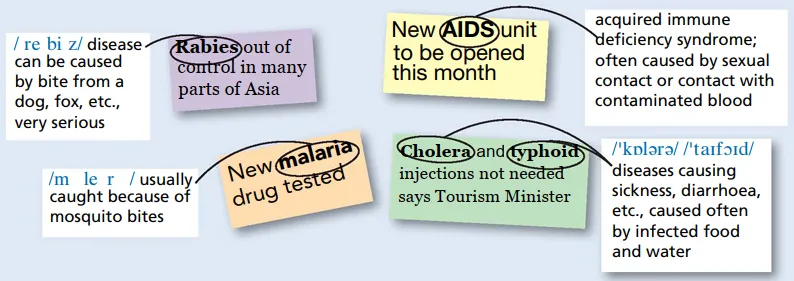A. Disasters/tragedies

- famine /ˈfæmɪn/ [no food]
- landslide [rocks and earth moving suddenly down a slope]
- epidemic [disease affecting large numbers of people]
- explosion (e.g. a bomb)
- major accident / incident (e.g. a plane crash)
- hurricane / tornado /tɔːˈneɪdəʊ/
- typhoon / tropical storm [violent wind / storm]
- war / civil war [civil war is war between people of the same country]
Disasters not caused by human beings can be called natural disasters.
Language help
Injure /ˈɪn.dʒər/ is used about people.
Damage /ˈdæm.ɪdʒ/ is used about things.
200 people were injured. Many buildings were damaged.
Verbs connected with these words
- A volcano has erupted in Indonesia. Hundreds are feared dead.
- The flu epidemic spread rapidly throughout the country.
- Millions are starving as a result of the famine.
- A big earthquake shook the city at noon today.
- The area is suffering its worst drought for many years.
- Civil war has broken out in the north of the country.
- A tornado swept through the islands yesterday.
B. Words for people involved in disasters/tragedies
- The explosion resulted in 300 casualties. /ˈkæʒ.ju.əl.ti/ [dead and injured people]
- The real victims of civil war are children left without parents. [those who suffer the results]
- There were only three survivors. /səˈvaɪ.vərz/ All the other passengers were reported dead. [people who live through a disaster]
- Thousands of refugees have crossed the border looking for food and shelter. [people who have escaped from their own country because of a war or other disaster]
- Millions of migrants enter the country each year, looking for a better life.
- During the battle, the dead and wounded /ˈwuːn.dɪd/ were flown out in helicopters. [wounded: injured in a battle / by a weapon]
C. Diseases/ epidemics
Here are some headlines from newspapers all connected with diseases and epidemics. Explanations are given.

|


Bình luận